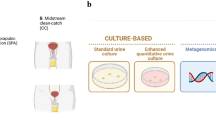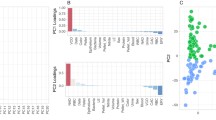Abstract
Purpose of Review
Greater availability of sequencing methods has broadened the knowledge of the urinary microbiome in an environment previously believed to be sterile. This review discusses internal and external influences that promote either a balance or a dysbiosis of the urinary tract and the future perspectives in understanding lower urinary tract infections.
Recent Findings
Efforts have been made to identify a “core” urinary microbiome in which Firmicutes and Bacteroidetes account for most of the bacterial representations. A shift to a Proteobacteria-dominant representation shapes the fingerprint of the infectious urinary microbiome; furthermore, the virome and the mycobiome are important modulators of the urinary microbiome, which have been recently explored to determine their role in the health-disease process of the lower urinary tract.
Summary
A disturbance of bacterial representation and diversity triggers a transition from health to disease; conversely, a functional cooperative interplay between the host and microbiome allows for basic metabolic and immune functions to take place.
Similar content being viewed by others
References
Papers of particular interest, published recently, have been highlighted as: • Of importance •• Of major importance
Cho I, Blaser MJ. The human microbiome: at the interface of health and disease. Nature Rev Genet. 2012.
Turnbaugh PJ, Ley RE, Hamady M, Fraser-Liggett CM, Knight R, Gordon JI. The human microbiome project. Nature. 2007.
Qin J, Li R, Raes J, et al. A human gut microbial gene catalogue established by metagenomic sequencing. Nature. 2010.
Whiteside SA, Razvi H, Dave S, Reid G, Burton JP. The microbiome of the urinary tract - a role beyond infection. Nature Rev Urol. 2015.
Aragón IM, Herrera-Imbroda B, Queipo-Ortuño MI, et al. The urinary tract microbiome in health and disease. Europ Urol Focus. 2018.
Nelson DE, van der Pol B, Dong Q, et al. Characteristic male urine microbiomes associate with asymptomatic sexually transmitted infection. PLoS ONE. 2010;5(11):1–7.
Siddiqui H, Nederbragt AJ, Lagesen K, Jeansson SL, Jakobsen KS. Assessing diversity of the female urine microbiota by high throughput sequencing of 16S rDNA amplicons. BMC Microbiol. 2011.
Wolfe AJ, Toh E, Shibata N, et al. Evidence of uncultivated bacteria in the adult female bladder. J Clin Microbiol. 2012.
Lewis DA, Brown R, Williams J, et al. The human urinary microbiome; bacterial DNA in voided urine of asymptomatic adults. Front Cell Infect Microbiol. 2013.
Fouts DE, Pieper R, Szpakowski S, et al. Integrated next-generation sequencing of 16S rDNA and metaproteomics differentiate the healthy urine microbiome from asymptomatic bacteriuria in ground-breaking neuropathic bladder associated with spinal cord injury. J Transl Med [Internet]. 2012;10(1):1. Available from: Journal of Translational Medicine.
Hilt EE, McKinley K, Pearce MM, et al. Urine is not sterile: use of enhanced urine culture techniques to detect resident bacterial flora in the adult female bladder. J Clin Microbiol. 2014.
Pearce MM, Hilt EE, Rosenfeld AB, et al. The female urinary microbiome: A comparison of women with and without urgency urinary incontinence. MBio. 2014.
Morand A, Cornu F, Dufour JC, Tsimaratos M, Lagier JC, Raoult D. Human bacterial repertoire of the urinary tract: a potential paradigm shift. J Clin Microbiol. 2018.
Tang J. Microbiome in the urinary system—a review. AIMS Microbiol. 2017.
Nelson A, De Soyza A, Perry JD, Sutcliffe IC, Cummings SP. Polymicrobial challenges to Koch’s postulates: ecological lessons from the bacterial vaginosis and cystic fibrosis microbiomes. Innate Immun. 2012;18(5):774–83.
Hasman H, Saputra D, Sicheritz-Ponten T, et al. Rapid whole-genome sequencing for detection and characterization of microorganisms directly from clinical samples. J Clin Microbiol. 2014.
Moustafa A, Li W, Singh H, et al. Microbial metagenome of urinary tract infection. Sci Rep. 2018.
Willner D, Low S, Steen JA, et al. Single clinical isolates from acute uncomplicated urinary tract infections are representative of dominant In Situ populations. MBio. 2014.
Santiago-Rodriguez TM, Ly M, Bonilla N, Pride DT. The human urine virome in association with urinary tract infections. Front Microbiol. 2015.
Saralaya V, Shenoy S, Baliga S, Hegde A, Adhikari P, Chakraborty A. Characterization of Escherichia coli phylogenetic groups associated with extraintestinal infections in South Indian population. Ann Med Health Sci Res. 2015.
Khasriya R, Sathiananthamoorthy S, Ismail S, et al. Spectrum of bacterial colonization associated with urothelial cells from patients with chronic lower urinary tract symptoms. J Clin Microbiol. 2013;51(7):2054–62.
• Bajic P, Van Kuiken ME, Burge BK, et al. Male bladder microbiome relates to lower urinary tract symptoms. Eur Urol Focus [Internet]. 2020;6(2):376–82. Available from: https://doi.org/10.1016/j.euf.2018.08.001. This study evaluated the association between LUTS intensity and the ability of EQUC and sequencing methods to detect bacteria.
Miller-Ensminger T, Garretto A, Brenner J, et al. Bacteriophages of the urinary microbiome. J Bacteriol. 2018.
Garretto A, Miller-Ensminger T, Wolfe AJ, Putonti C. Bacteriophages of the lower urinary tract. Nat Rev Urol. 2019;16(7):422–32.
Garretto A, Thomas-White K, Wolfe AJ, Putonti C. Detecting viral genomes in the female urinary microbiome. J Gen Virol. 2018.
Galtier M, De Sordi L, Maura D, et al. Bacteriophages to reduce gut carriage of antibiotic resistant uropathogens with low impact on microbiota composition. Environ Microbiol. 2016;18(7):2237–45.
Ackerman AL, Underhill DM. The mycobiome of the human urinary tract: potential roles for fungi in urology. Ann Transl Med. 2017;5(2):1–12.
•• Nickel JC, Stephens A, Landis JR, et al. Urinary fungi associated with urinary symptom severity among women with interstitial cystitis/bladder pain syndrome (IC/BPS). World J Urol [Internet]. 2020;38(2):433–46. Available from: https://doi.org/10.1007/s00345-019-02764-0. This study used sequencing methods and mass spectrometry to assess how variations in the urinary mycobiome were associated with urinary tract symptoms.
Paalanne N, Husso A, Salo J, et al. Intestinal microbiome as a risk factor for urinary tract infections in children. Eur J Clin Microbiol Infect Dis. 2018;37(10):1881–91.
Jeney SES, Lane F, Oliver A, Whiteson K, Dutta S. Fecal microbiota transplantation for the treatment of refractory recurrent urinary tract infection. Obstet Gynecol. 2020;136(4):771–3.
Magruder M, Sholi AN, Gong C, et al. Gut uropathogen abundance is a risk factor for development of bacteriuria and urinary tract infection. Nat Commun [Internet]. 2019;10(1):1–9. Available from: https://doi.org/10.1038/s41467-019-13467-w.
• Wolff BJ, Price TK, Joyce CJ, Wolfe AJ, Mueller ER. Oral probiotics and the female urinary microbiome: a double-blinded randomized placebo-controlled trial. Int Urol Nephrol [Internet]. 2019;51(12):2149–59. Available from: https://doi.org/10.1007/s11255-019-02282-3. Following oral probiotic randomization, this study found no change in the urine microbiota compared to controls.
• Mulder M, Radjabzadeh D, Hassing RJ, et al. The effect of antimicrobial drug use on the composition of the genitourinary microbiota in an elderly population. BMC Microbiol. 2019;19(1):1–7. This study evaluated the effects of antibiotics on the urinary microbiome. Changes in the microbiome may persist long after antibiotic use has stopped.
Rani A, Ranjan R, McGee HS, et al. Urinary microbiome of kidney transplant patients reveals dysbiosis with potential for antibiotic resistance. Transl Res. 2017.
Den Heijer CDJ, Geerlings SE, Prins JM, Beerepoot MAJ, Stobberingh EE, Penders J. Can the composition of the intestinal microbiota predict the development of urinary tract infections? Future Microbiol. 2016;11(11):1395–404.
Drake MJ, Morris N, Apostolidis A, Rahnama’i MS, Marchesi JR. The urinary microbiome and its contribution to lower urinary tract symptoms; ICI-RS 2015. Neurourology and Urodynamics. 2017.
Price TK, Dune T, Hilt EE, et al. The clinical urine culture: enhanced techniques improve detection of clinically relevant microorganisms. J Clin Microbiol. 2016;54(5):1216–22.
Coorevits L, Heytens S, Boelens J, Claeys G. The resident microflora of voided midstream urine of healthy controls: standard versus expanded urine culture protocols. Eur J Clin Microbiol Infect Dis [Internet]. 2017;36(4):635–9. Available from. https://doi.org/10.1007/s10096-016-2839-x.
Lee KW, Song HY, Kim YH. The microbiome in urological diseases. Investig Clin Urol. 2020;61(4):338–48.
Horwitz D, McCue T, Mapes AC, et al. Decreased microbiota diversity associated with urinary tract infection in a trial of bacterial interference. J Infect. 2015.
Mueller ER, Wolfe AJ, Brubaker L, Opin C. The female urinary microbiota HHS public access author manuscript. Curr Opin Urol. 2017;27(3):282–6.
Finucane TE. ‘Urinary tract infection’ and the microbiome. Am J Med [Internet]. 2017;130(3):e97–8. Available from. https://doi.org/10.1016/j.amjmed.2016.08.018.
Miller-Ensminger T, Garretto A, Brenner J, et al. Bacteriophages of the urinary microbiome. J Bacteriol. 2018;200(7):1–13.
Neugent ML, Hulyalkar NV, Nguyen VH, Zimmern PE, De Nisco NJ. Advances in understanding the human urinary microbiome and its potential role in urinary tract infection. MBio. 2020;11(2):1–15.
Acknowledgements
Dr. Sergio Lozano for text editing and revision.
Author information
Authors and Affiliations
Contributions
Protocol/Project development: Pallares-Mendez, Cervantes-Miranda, Guiterrez-Gonzalez. Data collection or management: Pallares-Mendez, Cervants-Miranda, Diaz Gonzalez-Colmenero, Gutierrez-Gonzalez, Ochoa-Arvizo. Manuscript writing editing: Pallares-Mendez, Cervantes-Miranda, Diaz Gonzalez-Colmenero, Ochoa-Arvizo, Gutierrez-Gonzalez.
Corresponding author
Ethics declarations
Conflict of Interest
The authors have no conflict of interest to disclose.
Human and Animal Rights and Informed Consent
This article does not contain any studies with human or animal subjects perfomed by any of the authors.
Additional information
Publisher's Note
Springer Nature remains neutral with regard to jurisdictional claims in published maps and institutional affiliations.
This article is part of the Topical Collection on Lower Urinary Tract Symptoms and Voiding Dysfunction
Rights and permissions
Springer Nature or its licensor holds exclusive rights to this article under a publishing agreement with the author(s) or other rightsholder(s); author self-archiving of the accepted manuscript version of this article is solely governed by the terms of such publishing agreement and applicable law.
About this article
Cite this article
Pallares-Mendez, R., Cervantes-Miranda, D.E., Gonzalez-Colmenero, A.D. et al. A Perspective of the Urinary Microbiome in Lower Urinary Tract Infections — A Review. Curr Urol Rep 23, 235–244 (2022). https://doi.org/10.1007/s11934-022-01108-7
Accepted:
Published:
Issue Date:
DOI: https://doi.org/10.1007/s11934-022-01108-7




